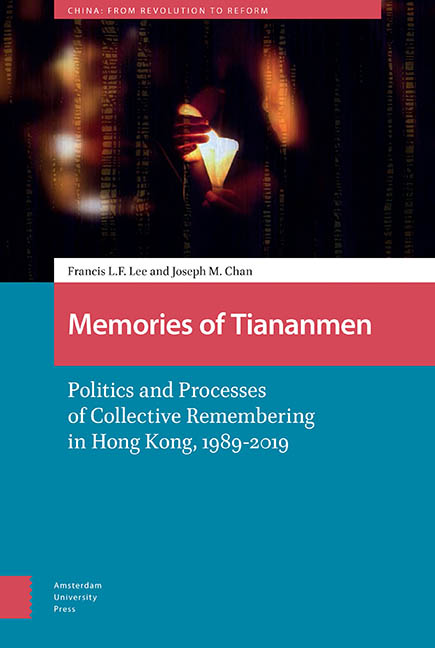Book contents
- Frontmatter
- Contents
- List of Figures and Tables
- Acknowledgments
- List of Abbreviations
- 1 Introduction
- 2 Memory Formation and the Valorization of Commemoration
- 3 Memory Mobilization
- 4 Intergenerational Memory Transmission
- 5 The Struggle for Memory Institutionalization
- 6 The Challenge of Localism and Memory Repair
- 7 Changing Attitudes toward Tiananmen?
- 8 Digital Media and Memory Balkanization
- 9 Conclusion
- Epilogue
- Appendix
- References
- Index
Epilogue
Published online by Cambridge University Press: 16 July 2022
- Frontmatter
- Contents
- List of Figures and Tables
- Acknowledgments
- List of Abbreviations
- 1 Introduction
- 2 Memory Formation and the Valorization of Commemoration
- 3 Memory Mobilization
- 4 Intergenerational Memory Transmission
- 5 The Struggle for Memory Institutionalization
- 6 The Challenge of Localism and Memory Repair
- 7 Changing Attitudes toward Tiananmen?
- 8 Digital Media and Memory Balkanization
- 9 Conclusion
- Epilogue
- Appendix
- References
- Index
Summary
Abstract
The epilogue recounts the major political events in Hong Kong between 2019 and 2020 and discusses their impact on collective remembering of Tiananmen. Specifically, the chapter discusses how and why the Anti- Extradition Law Amendment Bill Movement led to the establishment of the National Security Law. It then discusses the possible impact of the NSL on the collective memory processes described in the book. It ends with some suggestions about the possible future trajectory of collective remembering of Tiananmen in Hong Kong.
Keywords: Anti-ELAB Movement, National Security Law, trajectory of collective memory
Since this book was completed in the early months of 2019, two critical political events – the Anti-Extradition Law Amendment Bill Movement (Anti-ELAB Movement) and the passage of the National Security Law (NSL) – took place in Hong Kong and shook the city to its core. They resulted in the change of parameters governing Hong Kong, posing important implications for the sustainability of the collective memory of Tiananmen. Complicating the political scene was the occurrence of the COVID-19 pandemic, which the Hong Kong SAR Government cited for banning the June 4 candlelight vigil in 2020 – the very first time the vigil was banned. We deem it necessary to write this epilogue to take account of these events and discuss how they have impinged upon the framework in which the social memory of June 4 operates. Finally, we will probe into the future by taking stock of all the changes in view of the processual model we have elaborated in this book.
From the Anti-ELAB Movement1 to National Security Law
2019 marked the 30th Anniversary of the Tiananmen crackdown. In spite of the controversy over its relevance to Hong Kong among the young, the candlelight vigil in Victoria Park continued to have a good turnout of about 180,000 participants, presumably because of the special anniversary occasion and people's keen concern over the potential threat of the forthcoming amendment of the Fugitive Offenders Ordinance. The collective memory of June 4 was expected to continue along its trajectory as outlined in this book. However, on June 9, 2019, just a few days after the annual commemoration, over one million citizens flooded the streets to protest against the pending passage of the amendment bill which would allow the Hong Kong government to extradite criminal offenders to mainland China
- Type
- Chapter
- Information
- Memories of TiananmenPolitics and Processes of Collective Remembering in Hong Kong, 1989–2019, pp. 313 - 332Publisher: Amsterdam University PressPrint publication year: 2021



